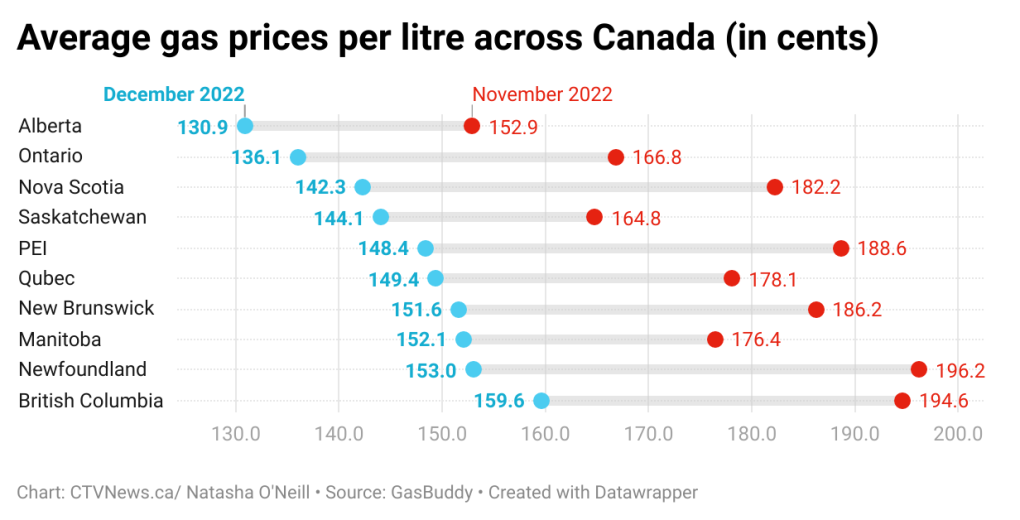The average price of gasoline across Canada tumbled over the last month, from 170.9 cents a litre to 142.1 cents a litre on average, according to GasBuddy, a tech company that tracks gas prices in the U.S and Canada.
One energy analyst says markets are in "panic mode" due to a possible recession, geopolitics and the Bank of Canada's latest interest rate hike. These factors have caused the recent dip in gas prices across the country but the relief is not expected to last.
"In the past month alone, we've been saving about 35 cents a litre," Dan McTeague, Canadians for Affordable Energy President, told CTV News Toronto in an interview on Friday. "I would say by the second or third week of January, look for prices to move up anywhere from 15 to 20 cents on average."
This weekend consumers can expect lower prices at pumps across most provinces and territories with British Columbia having the highest average of 159.7 cents per litre.
Alberta and Ontario drivers will enjoy average prices in the 130.0 cent range. Nova Scotia's average is 142.3 cents, Saskatchewan, 144.4 cents, Northwest Territories is around 145.9 cents, the Prince Edward Island average is 148.6 cents and Quebec drivers are seeing an average of 149.6 cents.
New Brunswick, Manitoba and Newfoundland are seeing prices in the 150.0 cent range.
This comes after several months saw record-breaking gas prices for consumers. The country recorded the highest national average cost for gas on June 12 with a price of 210.8 cents, reports GasBuddy.

WHY PRICES DROPPED THIS WEEKEND
"Markets are very nervous," McTeague told CTV News Toronto in an interview Friday.
McTeague says panic is due to a potential recession, strict COVID-19 lockdowns in China and increasing interest rates. Markets believe these factors may contribute to a "significant global slowdown."
"Of course, the demand numbers and the supply picture paint a very different story," he said of the steady demand for gasoline despite high prices.
In the past month, gas prices across Canada have fallen about 30 cents, but McTeague says diesel has consistently stayed high.
"Diesel has not moved, it's still in the $2 range," he said. "It's really the global workhorse of all fuels. The fact that it hasn't dropped shows that there's tight supply."
McTeague predicts there will be a "rebound" in prices in early January.
"I don't think we're gonna see lower prices, this is probably as good as it gets," he said. "(Gas prices) might drop a few more pennies between now and Christmas for the early Christmas gift, but beyond that, Scrooge awaits us in 2023."
WHY GAS PRICES FLUCTUATE
Gasoline prices are known to fluctuate from day to day and in each region. Natural Resources Canada, a federal government agency that oversees the country’s natural resources, explains on its website that there are many factors as to why gas prices fluctuate which are seen immediately at the pump.
When a consumer pays for gas there are four categories that person is paying for, which are the cost to extract crude oil from the ground, the cost of refining oil into gasoline and the cost to operate the retail location and taxes to governments, it states.
When there is a disruption to the chain, like world events, natural disasters or increased demand, prices will go up, it explains.
"The oil markets are extremely sensitive to these events and react quickly by raising or lowering prices if the available supply goes up or down," the website states.
https://news.google.com/__i/rss/rd/articles/CBMiWWh0dHBzOi8vd3d3LmN0dm5ld3MuY2EvYnVzaW5lc3MvbWFya2V0cy1pbi1wYW5pYy1tb2RlLWFzLWdhcy1wcmljZXMtZmFsbC1leHBlcnQtMS42MTg5NDY00gEA?oc=5
2022-12-10 18:02:00Z
CBMiWWh0dHBzOi8vd3d3LmN0dm5ld3MuY2EvYnVzaW5lc3MvbWFya2V0cy1pbi1wYW5pYy1tb2RlLWFzLWdhcy1wcmljZXMtZmFsbC1leHBlcnQtMS42MTg5NDY00gEA
Tidak ada komentar:
Posting Komentar